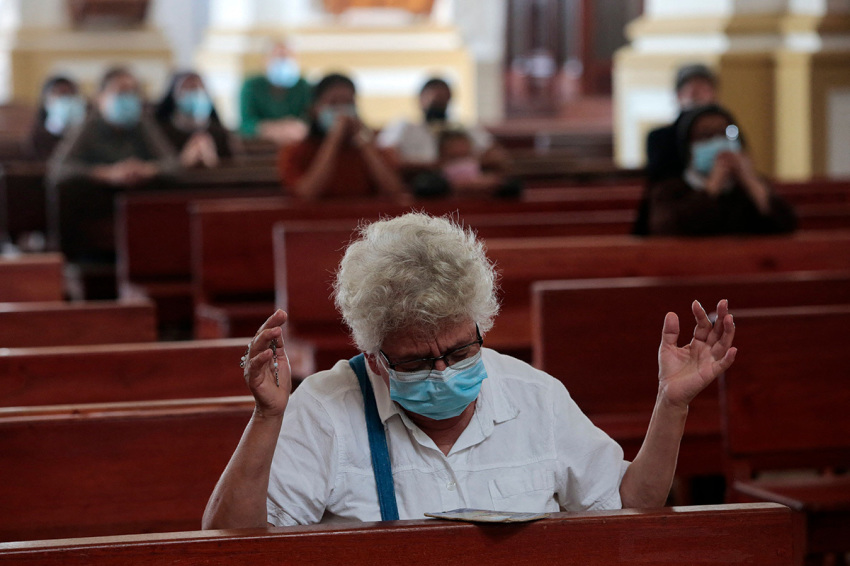Nicaragua expels lead bishop in further targeting of Catholic Church

Nicaragua has expelled Bishop Carlos Herrera, the head of the country’s Episcopal conference, in what appears to be a further step in its campaign against the Catholic Church, according to a report, which says the 75-year-old bishop was forced into exile in Guatemala.
The expulsion was sudden and has left the local Catholic community in shock, Reuters quoted Martha Molina, a lawyer with close ties to the Catholic Church in Nicaragua, as saying. She described Herrera as having been the target of “persecution by the dictatorship” and cited continuous harassment by leading security and administrative officials.
Molina added that Herrera’s recent criticism of the government, specifically pointing out disturbances during his religious services by individuals linked to local authorities, prompted his expulsion. Herrera’s masses in Jinotega were reportedly disrupted by loudspeakers set up outside by individuals tied to the mayor’s office.
Costa Rican Bishop Manuel Eugenio Salazar was quoted as saying, “May the Immaculate Conception crush the old serpent’s head!”
The Nicaraguan government has not issued any statement regarding Herrera’s expulsion.
The government of President Daniel Ortega has increasingly targeted the Catholic Church since 2018, following a series of anti-government protests during which numerous church leaders, including Herrera, acted as intermediaries between the government and protestors.
Herrera was known for negotiating the release of several young people arrested during the 2018 demonstrations in Jinotega, a role that likely positioned him unfavorably with the administration.
Ortega’s government has accused the Catholic Church of supporting opposition movements and has intensified its crackdown on religious institutions, civil society organizations and independent media over the past five years.
Many other clergymen have been expelled from Nicaragua, and Catholic-affiliated media outlets have been shut down. Bishop Rolando Álvarez of Matagalpa, who has been a prominent critic of the government, was exiled to Rome earlier this year. The government has gone as far as to seize a prominent Jesuit-run university in Managua.
In August, the Nicaraguan government’s crackdown expanded to include Protestant churches, marking a significant broadening of its policy of religious suppression.
Scores of Protestant churches and the Nicaraguan Evangelical Alliance were among 169 civil society organizations that were stripped of their legal status. The move followed the revocation of the legal registration for about 1,500 nonprofit organizations, including numerous religious entities, as part of the government’s crackdown on civil society.
A total of 5,552 organizations have had their legal status revoked since 2018, according to the U.K.-based group Christian Solidarity Worldwide. Historic denominations such as the Episcopal Church of Nicaragua, founded in 1612, and the Moravian Church of Nicaragua, which dates back to 1847, were affected by these revocations. Both churches have long played crucial roles in providing education and community services, particularly in indigenous and Afro-descendent communities in the South Caribbean Autonomous Region.
The First Baptist Church of Managua, established in 1917 and renowned for its community contributions, also had its legal status canceled. The church’s services include operating schools, a seminary, a hospital, and a radio station, which now face uncertainty.
The government’s decree further targeted smaller and lesser-known congregations like the Shalom First Presbyterian Church of Nicaragua and the Gospel Eternal Message of the Three Angels Adventist Church, among others, revoking their permits to operate legally within the country.
Properties linked to these organizations, including church buildings and land, are being transferred to state control, continuing a pattern seen in previous seizures benefiting government entities like the Nicaraguan Army and the Nicaraguan Social Security Institute.
A report from the U.S. Commission on International Religious Freedom, published in June, suggested increased surveillance and threats during church services.
President Ortega secured a controversial fifth term in 2021. Since then, his administration, led by the far-Left Sandinista National Liberation Front, has jailed political opponents, journalists and civil society activists, citing national security concerns.



























